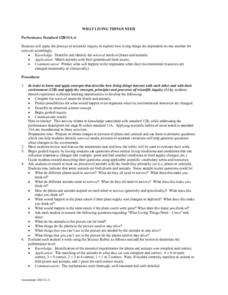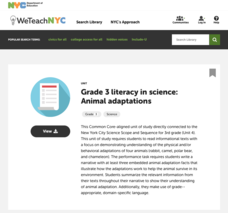Curated OER
Archimedes' Principle of buoyancy
Learners use the internet to research Archimedes' principle of buoyancy. In groups, they summarize the principle and share it with the class. They also participate in experiments in which they test the principle and share their results...
University of North Carolina
Sciences
Science writing follows many of the same principles as writing in language arts, but some structural details differ. Individuals read an online science handout that covers how to write with precision, choose appropriate details, and use...
Curated OER
Introduction to Scientific Theory
Ninth graders explain how scientists set up investigations. In this scientific process instructional activity, 9th graders review the principles of the scientific method and use these skills to answer an open-ended question about how to...
Florida International University
Design Your Own
Apply scientific principles to designing an experiment to study organisms living on the coral reef in our oceans. Through reading, individuals learn about the coral reef ecosystem and important factors that affect its function....
Curated OER
Diffusion
Students design and carry out an experiment according to the scientific method. The experiment must test the effects of time and concentration on the rate of diffusion of potassium permanganate into potato cubes. After performing the...
Bonneville
Learning About Solar Updraft Towers
Give it up for updraft towers. Pupils learn about solar updraft towers by first watching a video. They then research these structures on their own and think about how the toys they made in the previous lesson use the same scientific...
National Wildlife Federation
Citizen Science to the Rescue!
You don't have to be a scientist or even out of high school to contribute to scientific research. In the 12th lesson plan in the series of 21, scholars use this opportunity to add to the growing body of scientific knowledge and consider...
Curated OER
Foodborne Illness Outbreak Investigation
Students demonstrate how epidemiological investigations of outbreaks are performed. They illustrate the principles of hypothesis formation and testing by epidemiologic study in the setting of an acute foodborne disease outbreak.
Curated OER
Dive Into Submarines
Students research the history and scientific principles of submarines. They read about living and working on a submarine and design and display a realistic replica of a submarine.
Centers for Ocean Sciences
Ocean and Great Lakes Literacy: Principle 7
Your mission, should you choose to accept it, is to take your class on an underwater adventure. The final installment in a seven-part series involving salt and freshwater bodies takes junior oceanographers below the surface in...
Curated OER
What Living Things Need
Learners apply the process of scientific inquiry to explore how living things are dependent on one another for survival. They match animals with their generalized food source. Students predict what happens to the organisms when their...
Curated OER
Focusing on Lenses
Students explore scientific observations by examining the parts of a microscope. In this optics lesson, students discuss the importance of a focal point and focal distance when utilizing an optical device such as a microscope. Students...
Curated OER
Apply Technological Design and Scientific Habits of Mind
High schoolers work together to brainstorm their obstacles in testing different scientific principles. In groups, they are given a scenerio with a specific dilemma and they use the internet to research how to solve the problem. They...
Curated OER
Playing With Science
Young scientists investigate the scientific concepts and principles that help make common toys such as hula hoops, yo-yos, slinkies, and silly putty work. As a class, they read "Backyard Rocket Science, Served Wet" to get a look behind...
NOAA
Off Base
How does carbon dioxide affect the world's oceans? The final installment in a series of six lessons has pupils research ocean acidification, then conduct an experiment to witness the delicate balance that exists in our seas. Materials...
Curated OER
Looking at French Decorative Arts: The Science of Good Design
Students examine the style of an 18th-century compound microscope and its case. In this scientific design lesson plan, students look at Jacques Caffieri's, "Compound Microscope and Case" before comparing the design to a modern...
Alabama Learning Exchange
Animal Classification
Present information about the classification of animals. After participating in the teacher-led discussion about scientific names, small groups devise their own way of classifying everyday objects present in the classroom, developing...
Curated OER
Let's Get Warm!
Students investigate various methods that animals use to warm up in cold weather. They also explore the science principals involved. They then identify a human parallel, discuss what we can learn from nature, and create multimedia...
New York City Department of Education
Grade 3 Literacy in Science: Animal Adaptations
Third graders research and study animal adaptations and then use their findings to write narratives that include scientific criterion. This lesson is all about literacy and science! The lesson is completely designed for addressing Common...
Curated OER
Snell's Law
Students determine whether the index of refraction of sample of Corn Syrup meets Federal standards. This task assess students' abilities to explain the procedures for investigation, plan for recording and organizing observations and...
Curated OER
For the Birds
Second graders observe, identify, and document birds sighted at the library feeder station. They observe and document birds in order to begin their birder's life list. They apply scientific concepts and principles by using library...
Curated OER
Pharmaceutical Lesson Plan
Students are able to discuss and prepare a written summary of a scientific article about AIDS. They propose solutions to the opening activity of which drug is more effective in the fight against AIDS.
Curated OER
Motion in Fluids
Students explore physical science by participating in a science activity. In this liquids activity, students discuss how fluids can be affected by motion unlike solids. Students define other scientific vocabulary terms and conduct a...
Curated OER
Classification in Action
Students work with a set of objects to set up both quantitative and qualitative classification systems. As a group, students follow an example to design and complete two classification systems using a set of objects provided. ...























